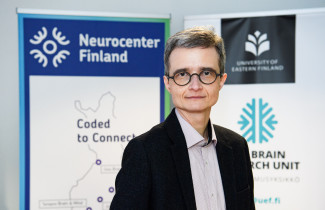In a new multinational study, persons with very early Alzheimer's disease showed a reduced rate of cognitive-functional decline after a six-month multidomain lifestyle intervention combined with medical food. The MIND-ADmini trial was the first to show the feasibility of such a combined intervention in prodromal Alzheimer’s disease. The study was recently published in the leading Alzheimer’s translational research journal, Alzheimer’s Research and Therapy.
MIND-ADmini was a 6-month proof-of-concept randomised controlled trial carried out in Sweden, Finland, Germany and France. Participants were 60–85 years old, had very early (prodromal) Alzheimer’s disease and vascular and lifestyle risk factors that were not well managed at baseline. A total of 93 participants were randomly assigned to three groups. One group took part in a multidomain lifestyle intervention including nutritional guidance, exercise, cognitive training, vascular and metabolic risk management and social stimulation. Another group took part in the multidomain lifestyle intervention and used a specifically formulated medical food, Fortasyn Connect, daily. The third group received regular health advice and care, acting as a control group.
The researchers were interested both in the feasibility of the multidomain intervention and in the participants’ adherence to each intervention component and to healthy lifestyle changes. Cognitive and functional assessments were included as exploratory outcomes.
Of all participants, 91.4% remained in the study throughout the six-month period. Adherence to all domains of the lifestyle intervention and especially to cognitive training and nutritional guidance was higher in the group who also used the medical food. Compared with controls, both intervention groups showed improvements in terms of a healthier diet. The lifestyle and medical food group also showed a significant reduction of cardiovascular risk and a reduced rate of cognitive-functional decline.
Dementia risk can be reduced even after symptoms appear
MIND-ADmini builds on the successful results and experience of the pioneering Finnish Geriatric Intervention Study to Prevent Cognitive Impairment and Disability (FINGER), which earlier showed cognitive benefits from a multidomain lifestyle intervention in at-risk older people from the community. In parallel, the LipiDiDiet trial highlighted clinical benefits of Fortasyn Connect in patients with prodromal Alzheimer’s disease. However, the feasibility and impact of multidomain interventions combining lifestyle with medical food in prodromal AD has not been studied earlier.
“A natural next step was to combine two successful approaches – non-pharmacological and medical food – and test their feasibility and potential synergy in people who already experience cognitive symptoms due to Alzheimer's disease. Recent estimates indicate that there are 69 million people with prodromal Alzheimer’s disease worldwide, and for them there is a lack of effective preventive and therapeutic solutions. The encouraging new results pave the way for larger clinical trials investigating longer-term cognitive and other health benefits of such combined approaches,” says Professor Miia Kivipelto from Karolinska Institute, FINGERS Brain Health Institute (www.fbhi.se), and the University of Eastern Finland.
Kivipelto led both the larger MIND-AD and FINGER trials and is the scientific leader of the World-Wide FINGERS network of multidomain trials for risk reduction of dementia.
Another newly published study in Alzheimer’s Research and Therapy demonstrated cognitive and functional benefits of more intensive lifestyle changes in patients with mild cognitive impairment or early dementia due to Alzheimer’s disease. The 20-week clinical trial was led by Dr. Dean Ornish from the Preventive Medicine Research Institute and University of California, San Francisco, with Kivipelto as one of the partners.
“These findings add to the growing body of evidence that moderate multimodal lifestyle changes may help reduce the risk of Alzheimer’s disease or slow its progression, and also suggest that more intensive multimodal lifestyle changes may have additional benefits,” says Professor Alina Solomon from the Brain Research Unit at the University of Eastern Finland, who was the Scientific Coordinator for the MIND-ADmini trial.
The MIND-AD trial was supported by the EU Joint Programme - Neurodegenerative Disease Research (JPND) project MIND-AD and the following JPND projects EURO-FINGERS and Multi-MeMo, co-funded by the Research Council of Finland.
For further information, please contact:
Professor Miia Kivipelto, [email protected], +46 73 9940922
Professor Alina Solomon, [email protected], +358 40 355 2015
Research articles (Open Access):
Thunborg, C., Wang, R., Rosenberg, A. et al. Integrating a multimodal lifestyle intervention with medical food in prodromal Alzheimer’s disease: the MIND-ADmini randomized controlled trial. Alz Res Therapy 16, 118 (2024). https://doi.org/10.1186/s13195-024-01468-x
Ornish, D., Madison, C., Kivipelto, M. et al. Effects of intensive lifestyle changes on the progression of mild cognitive impairment or early dementia due to Alzheimer’s disease: a randomized, controlled clinical trial. Alz Res Therapy 16, 122 (2024). https://doi.org/10.1186/s13195-024-01482-z



